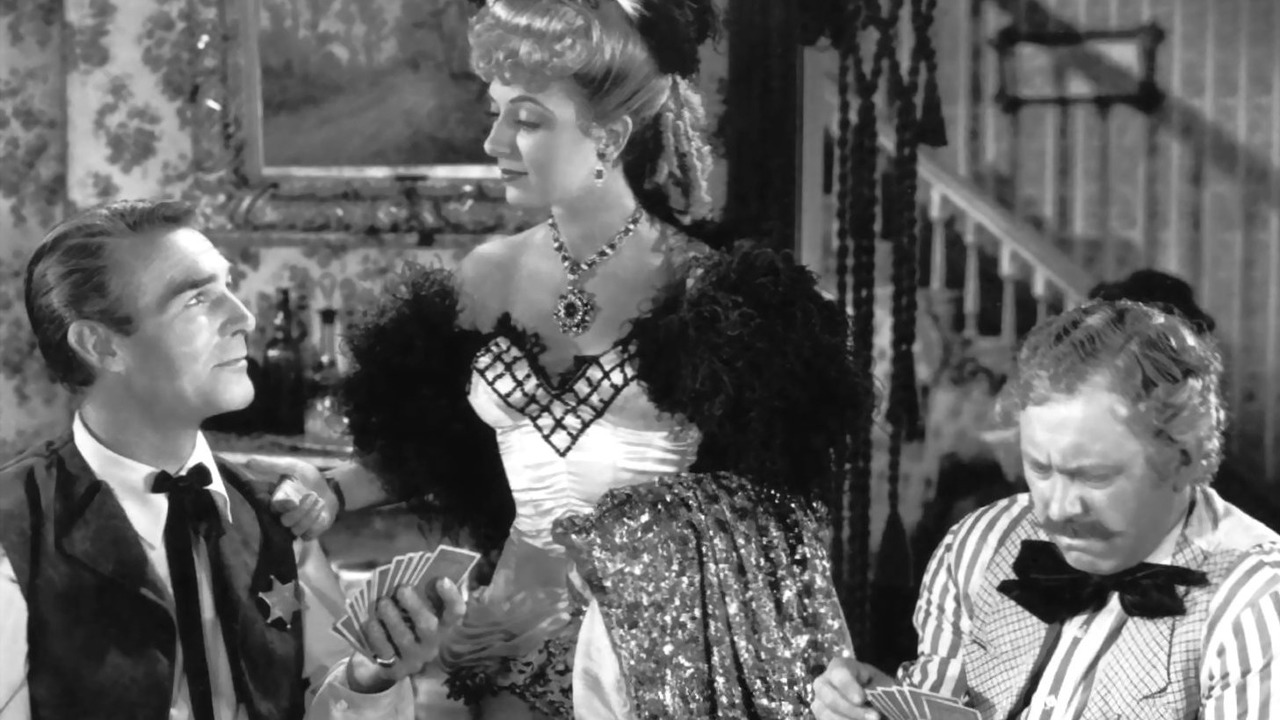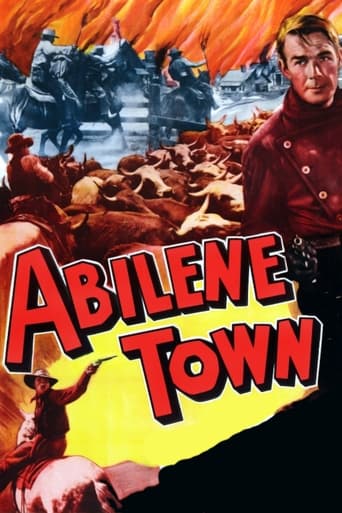ReaderKenka
Let's be realistic.
TeenzTen
An action-packed slog
Curapedi
I cannot think of one single thing that I would change about this film. The acting is incomparable, the directing deft, and the writing poignantly brilliant.
Bluebell Alcock
Ok... Let's be honest. It cannot be the best movie but is quite enjoyable. The movie has the potential to develop a great plot for future movies
Robert J. Maxwell
It's Abilene, Kansas, the end of the cattle drive from Texas. (Cf., "Red River.") The town depends on the money the rough-hewn cowboys bring in. One side of Texas Street is all saloons; the other is all merchants or, as they're usually called, goods and mercantile shops. The town exists in a steady state, moderated at time by the town marshal, Scott, and the cowardly county sheriff, Buchanan. One day a flood of homesteaders plods through and takes up residence on farm lands just outside. They fence off the land and the cattlemen don't like it. (Cf., "Shane".) The head cattleman hires a gunfighter. (Loc. cit.) Conflict ensues. The farmers win and the cattlemen are tamed. Scott marries the right girl (Dvorak).Edgar Buchanan, when we first see him, muses about "going back to dentistry." Before films, Buchanan was a dentist like his father. He was a graduate of what is now Oregon Health & Science University School of Dentistry. He moved his practice to California before entering films.The moral calculus is confusing. I was never very good at calculus to begin with but I could usually come up with a decent gestalt. Not here. Let me see. The cattlemen discover their trail is fenced off by farmers, so they destroy the fence and several homesteaders. Everyone in town anticipates their coming to wreck the store that sold the barbed wire to the farmers. And, as expected, a horde of cowpunchers rides portentously into town. Do they attack the barbed wire store? No. They bust into the closed saloons. Dvorak owns one of the saloons. Why doesn't she try to stop the chaos? A young, headstrong farmer, Lloyd Bridges, leads the homesteaders onto the land and fences it in, claiming it's government land, we have a right to fence it off. If the government land is free, don't the cattlemen have a right to use the land, pari passu? Why are the farmers treated as the "good guys" when they could have avoided conflict by leaving an open path through their many acres for the drovers to use? They might have charged a small fee.Scott is his usual taciturn self, but he smiles tolerantly more often. Buchanan is sometimes amusing. He loves to win card games, so when he runs into a redneck farmer he's eager to teach him how to play. When the hands are dealt, the tyro asks, "What did you say was higher -- a King or a Queen?" Buchanan leans over and examines the other guy's cards. "Mmmm. Let's deal another hand." It wouldn't have been funny if Buchanan had simply lied.Dvorak is pretty in an unusual way. She has a great smile and her eyes are startling. And she did a memorable hootch-kootchie in "Scarface." Here she sings too much as a dance hall girl. And her name -- I never know how to pronounced it. Is it pronounced as it's spelled? Or is it pronounced "Dvor-zhak" like the Czech composer's? And what the hell was the matter with her real name, Anna McKim? Somebody's pulling the wool over somebody's eyes around here.It occurred to me while watching this that three of the community forces involved here correspond rather neatly to three of the American regions described in Colin Woodard's book, "American Nation." The homesteaders are Woodard's "Yankees" who migrate as a cohesive community full of ambition. The rowdy cowboys are Woodard's "Appalachians" who reject regulations and believe a man is responsible for his own actions. Scott is a "Borderlander," like a Philadelphian, who is tolerant and peaceful and egalitarian. There have been reviews claiming that this is some kind of hidden gem, a secret cinematic triumph, but it really isn't. It's a decent Western. Randolph Scott never offends. I kind of enjoyed it.
JohnHowardReid
A minor western classic, detailing the conflict between cattle men and homesteaders in Abilene, Kansas, in the 1870s, Abilene Town has much to commend it, not the least of which is the superb black-and-white cinematography by Archie J. Stout. One of the chief beneficiaries of Stout's fine work is Ann Dvorak, who has never looked more attractive than she does here. Her singing is a treat too, as she renders three or four saucy songs with admirable vitality, backed up by Sammy Lee's chorus girls.Scott is more than his usual competent self. In fact he gives one of the best performances of his career. Forced to straddle both sides of the fence, the marshal's sympathies are clearly with the raucous cowboys rather than the calculating merchants or the scruffy homesteaders. The interesting thing is that the script obviously favors the "good" people, but Scott brilliantly plays against the screenplay, his carefully controlled poker face revealing to the audience with just an occasional fleeting expression, a glance, a gesture, which side he favors in his heart, and his inner conflict that forces him to fight on the side that he knows will survive. Scott's adversaries on the "wrong" side of the street are forcefully played by Richard Hale, Jack Lambert and Dick Curtis. On the right side, he has to contend with Howard Freeman, Rhonda Fleming and Lloyd Bridges. Finally, he is forced to watch "his" Abilene self-destruct. "This is how a tough town dies—not with a roar, but with a whine."
wes-connors
Five years after the US Civil War, western folk are more concerned with the age old war between homesteaders and cattle ranchers. The cattlemen herd their wares, from Texas to the trail town of Abilene, Kansas. There, the cowboys find not only big money, but also big confrontation, with homesteaders. Tall in the saddle Marshal Randolph Scott (as Dan Mitchell) tries to keep peace in the town. Mr. Scott has experience mediating between trail hands and saloon patrons. He also juggles the town's finest looking women: sexy saloon singer Ann Dvorak (as Rita) and pretty church lady Rhonda Fleming (as Sherry). Boozy county Sheriff Edgar Buchanan (as Bravo Trimble) offers more comic relief than sharp-shooting assistance."Abilene Town" begins with some promising symbolism and contrast: gunshots interrupt Scott and Ms. Fleming singing a hymn in Church; then, the camera switches to Ms. Dvorak sexily singing her saloon number, which causes a man to fire his gun in pleasure. After that, it really becomes quite a standard western; it is somehow duller than it should be, but not quite awful. Young Lloyd Bridges appears as one of the homesteaders. Dvorak's leggy costume is the film's greatest asset; in it, she is a real mover. **** Abilene Town (1/11/46) Edwin L. Marin ~ Randolph Scott, Ann Dvorak, Edgar Buchanan
weezeralfalfa
An unpretentious but,in fact,epic rendition of the classic conflict between open range cattlemen and wire-fencing homesteaders, between rowdiness and vice and the enforced rudiments of civilized town life. Iron-jawed no nonsense Randolph Scott, as town marshal Dan Mitchell, has the dangerous job of trying to keep the peace between 3 factions: the cattlemen and entertainment side of Abilene's main street, the merchants and bankers on the other side of the street and the rather newly arrived homesteaders in the surrounding region. Naturally, the cattlemen resent the intrusion of the homesteaders onto formerly open range. When gentle persuasion fails, the cattlemen try to burn out the sod busters in a scene reminiscent of the previous classic "The Westerner". When this fails to drive them out, they stampede their cattle through the homesteader's territory. Scott must serve as the main gun and mouth defending the interests of the merchants and homesteaders against the gun-totting lawless cattlemen.Edgar Buchanan's unbelievably cowardly and incompetent character as county sheriff is my main disappointment in this film. Ironically named Bravo, presumably, he is supposed to add some humor to Scott's stone-faced demeanor. But, he comes across as mostly pathetic rather than humorous. Let sleeping dogs lie and run from barking dogs is his ethos. I don't understand why perfectionist Scott puts up with him as his main ally(but sometimes antagonist) in carrying out his duties as town marshal. Scott even gives him bogus credit in a capture, so he won't lose his job!In the romance department, Scott has a bit of a thing going on with flamboyant dance hall queen Anne Dvorak, representing the wild west side of town, as well as with straight-laced Rhonda Fleming, representing the merchant's side of town. About half way through the film, we think we know which one will ultimately win Scott's heart, but we may get surprised. Most of the limited humor in the film relates to the obvious love-hate relationship between Scott and Anne. Rhonda appears to be a brunette in this B&W film, but in "Alias, Jesse James" for example, we see her famous flaming red hair.Anne gets to sing 3 songs: the enthusiastic opener on stage: "I Love it Out Here in the West", then "All You Got to do", and finally "Every Time I Give My Heart". The focus is often a bit fuzzy on my DVD copy. There are several newer DVD releases which may have used better copies? Try to get one of several double feature DVD releases. Mine also contains "Santa Fe Trail".

